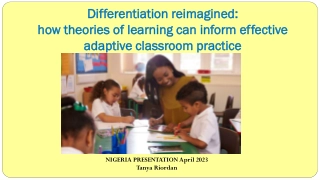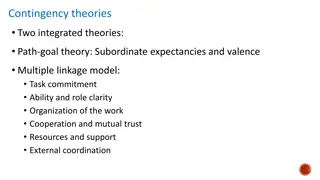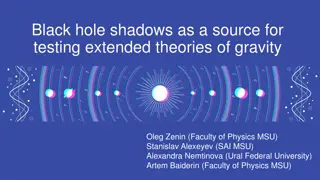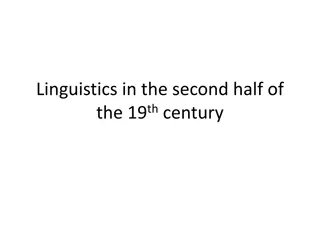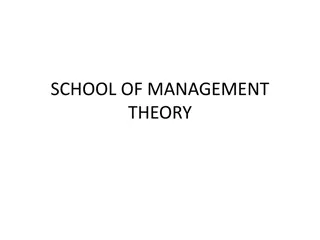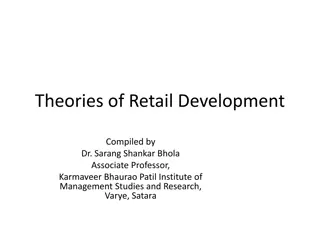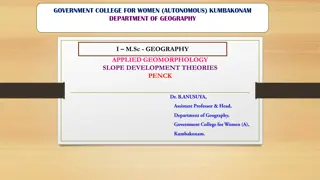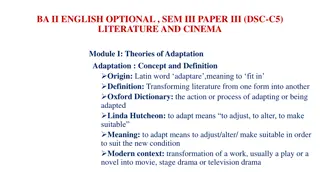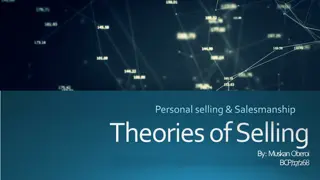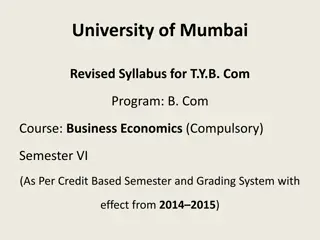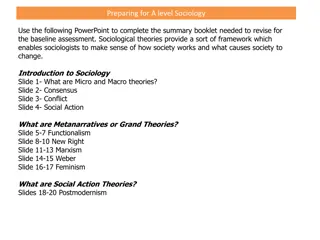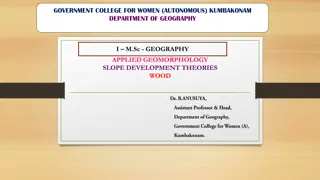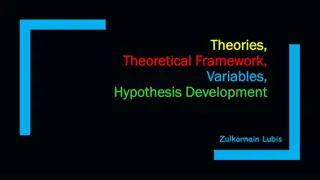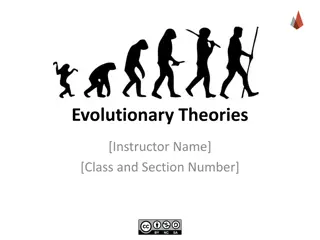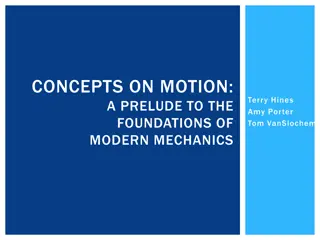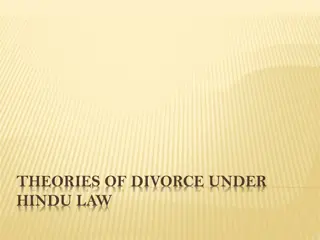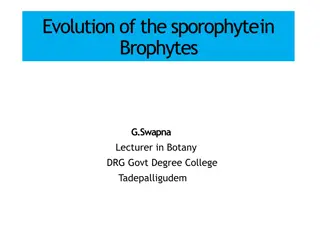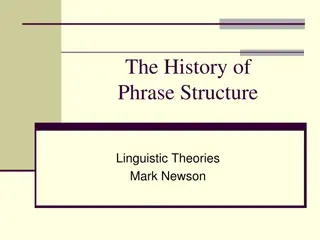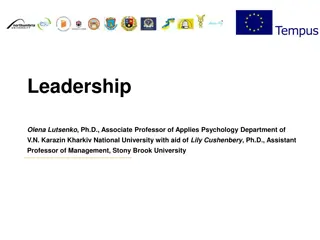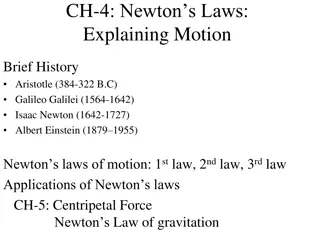Reimagining Differentiation: Enhancing Classroom Practice Through Learning Theories
Explore how theories of learning can inform effective adaptive classroom practice, focusing on the concept of differentiation. The presentation delves into reimagining differentiation, key theories supporting it, and practical strategies to support differentiation in language classrooms. The researc
1 views • 35 slides
Leadership Theories and Power Dynamics in Organizations
Explore contingency theories, dyadic theories, power and influence concepts, and leadership lessons from "12 Angry Men". Dive into the significance of leader-member exchange (LMX), political skills, and the interplay between power, politics, and organizational efficiency.
2 views • 27 slides
Theories Explaining Deviant Sexual Behavior Throughout History
Explore historical theories on deviant sexual behavior, including demonological, anomie, psychoanalytical, human ecology, and somatotyping theories. These theories range from supernatural beliefs of possession to scientific interpretations of societal influences and individual characteristics.
2 views • 33 slides
Testing Extended Theories of Gravity Using Black Hole Shadows
Exploring the shadows of black holes as a method to test extended theories of gravity, this study discusses the existence of black holes, gravitational wave astronomy, and direct imaging. Researchers Oleg Zenin, Stanislav Alexeyev, Alexandra Nemtinova, and Artem Baiderin present findings on black ho
6 views • 18 slides
Linguistics in the Second Half of the 19th Century: Schleicher, Psycholinguistics, Neogrammarian Theories
August Schleicher's biological approach to language, including his Stammbaumtheorie, aligned with Darwinian ideas prevalent in the 19th century. The origins of psycholinguistics can be traced back to Heymann Steinthal, who advanced the psychology of language. This period saw critical developments in
4 views • 22 slides
Insights into Theories of Motivation and Their Application
Motivation, a driving force behind human behavior, is explored through various theories like Maslow's hierarchy of needs, McClelland's learned needs theory, and others. Understanding these theories can help organizations enhance worker productivity by addressing different motivational factors.
10 views • 21 slides
Evolution of Management Theories: Classical Approach and Scientific Management
Explore the evolution of management theories focusing on the Classical Approach and Scientific Management. The Classical Approach emphasizes efficiency and specialization, while Scientific Management introduced systematic methods to increase productivity. Learn about key figures like Frederick Winsl
8 views • 31 slides
Business Ethics Theories and Principles
Explore various business ethics theories including Ethical Concepts, Moral Behavior Development, Ethical Principles, and the Role of Ethics in Business. Delve into the concept of ethics, moral behavior evolution, ethical principles like autonomy, honesty, justice, and integrity, and the importance o
10 views • 17 slides
Managerial Theories and Criticisms
Delve into the world of management theories, from classical to modern approaches, exploring the foundational principles of management, the evolution of theories, and criticisms of traditional perspectives. Learn about the basic functions of management and the insightful perspectives of renowned theo
2 views • 11 slides
Introduction to Organizational Behavior: Management Theories and Practices
Explore the evolution of organizational behavior from early management theories to contemporary practices. Understand the historical foundations and relevance of management theory in shaping workplace dynamics. Delve into key concepts like Scientific Management, Administrative Management, Bureaucrat
1 views • 28 slides
Theories on the Origin of State: Divine, Force, Patriarchal, and More
Various theories such as Divine Origin, Force Theory, Patriarchal Theory, and others explain the origin of the state. Divine theories attribute state creation to God, while Force Theory emphasizes the strong subjugating the weak to establish authority. Each theory offers unique perspectives on the h
1 views • 24 slides
Theories of Retail Development and Environmental Adaptation
The theories of retail development explore different frameworks such as Environmental, Cyclical, and Conflictual theories to understand how retail evolves and adapts to changing environments. The Environment Theory emphasizes the importance of adapting to survive in a competitive market, while the C
0 views • 14 slides
Psychological Theories of Criminality: Understanding the Roots
Psychological theories of criminality delve into the association between intelligence, personality, learning, and criminal behavior. Major theories include Psychodynamic Theory by Freud, Behavioral Theory by Bandura, and Cognitive Theory by Kohlberg. These theories explore how unconscious mental pro
1 views • 20 slides
Leadership Theories: Traits and Behaviors
Leadership theories have evolved from trait theory focusing on personal qualities to behavioral theories emphasizing actions and interactions. While early research sought universal traits for leadership, it encountered challenges due to varied traits among leaders and non-leaders. Behavioral theorie
2 views • 29 slides
Slope Development Theories by Walther Penck in Geomorphology
Explore the Slope Development Theories by Walther Penck in Geomorphology, focusing on concepts like Pendiplanation, Pedimentation, and the relation between endogenic and exogenic forces in shaping landscapes. Learn about the evolution of landforms and the criticism of the Davisian theory of Erosion
1 views • 28 slides
Theories of Adaptation in Literature and Cinema
The concept of adaptation involves transforming literature from one form to another, such as from a play or novel into a movie or television drama. Various approaches and theories of adaptation exist, including perspectives from theorists like Linda Hutcheon, Bela Balazs, and Andre Bazin. These theo
1 views • 9 slides
Unraveling COVID-19 Conspiracy Theories and Hoaxes
Exploring various conspiracy theories surrounding the origins of COVID-19, from bat soup to bioweapons and espionage. Dive into wilder theories involving population control, world war, and even Disney's supposed predictions. Understand the differences between conspiracy theories and hoaxes, shedding
3 views • 11 slides
Overview of Modern Sales Approaches and Salesmanship Theories
Various salesmanship theories including AIDAS Model, Right Set of Circumstances Theory, Problem-Solving Approach, and Modern Sales Approach are discussed. These theories elaborate on steps involved in selling, modification of models, importance of situations and buyer-oriented strategies. Salesperso
1 views • 11 slides
Theories of International Trade: Comparative Cost Theory and Absolute Cost Advantage
This content discusses the classical theories of international trade, focusing on Comparative Cost Theory and Absolute Cost Advantage introduced by economists like Adam Smith and David Ricardo. The assumptions, principles, and examples related to these theories are highlighted, emphasizing the conce
2 views • 41 slides
Sociological Theories and Frameworks
Sociological theories, encompassing micro and macro perspectives, provide a lens to interpret societal dynamics. Consensus theories like functionalism emphasize shared norms, while conflict theories such as Marxism highlight social inequalities. Social action theories like interactionism focus on in
5 views • 21 slides
Online Seminar: Theories of Learning in Initial Teacher Education
This collection of online seminar slides introduces pre-service teachers to major theories of learning, including the Science of Learning through cognitive neuroscience. The presentation aims to help educators consider implications for teaching, recognize theories in action, and pose critical questi
1 views • 11 slides
Slope Development Theories in Applied Geomorphology
Slopes are formed through different processes as described by Wood's slope development theories, such as the Four Unit Slope Model and the 9-Unit Slope Model. These models illustrate various manifestations of slope profiles based on factors like rock composition and water movement. Different slope t
0 views • 10 slides
Theories of Causation in Psychological and Social Sciences
Overview of theories of causation categorized into psychological, social psychological, and sociological perspectives. Psychological theories focus on instinctive, biological, and psychological qualities of abusers, including Attachment Theory, Psychodynamic Theory, Social Learning Theory, and Situa
0 views • 15 slides
Introduction to Quantum Chromodynamics & Field Theories in High-Energy Physics
Explore the fundamentals of Quantum Chromodynamics and Classical Field Theories in this informative lecture, covering topics such as global and local symmetries, Lagrangians, actions, and dynamics. Understand the significance of global and local symmetries in classical field theories, along with exa
5 views • 17 slides
Comprehensive Overview of Student Affairs Theories
This collection explores key theories in student affairs, including cognitive-structural theories, learning theories, and person-environment theories. Cognitive-structural theories delve into how individuals process information, while learning theories examine how people absorb knowledge. Person-env
3 views • 19 slides
Theories and Concepts in Research
The content delves into the fundamental concepts of theories and variables in research. It discusses the nature of theories, including descriptive, explanatory, and predictive theories. Additionally, it examines the role of concepts in providing identity and meaning to objects and phenomena. Through
2 views • 55 slides
Classical Trade Theories and Their Limitations in International Economics
Classical trade theories such as the Theory of Absolute Advantage by Adam Smith and the Theory of Comparative Advantage by David Ricardo highlight the benefits of free trade and specialization based on natural advantages. However, these theories have limitations, such as the inability to explain sce
0 views • 8 slides
Applying Theories and Models in Integrated Health: Module 3 Overview
This module delves into the application of various theories, perspectives, and practice models in integrated healthcare. Students will learn to utilize different theories to enhance their understanding and practice in integrated health, focusing on aspects like personal impact, behavioral change the
0 views • 78 slides
Accelerating Lemma Learning Using Joins in Satisfiability Modulo Theories
Explore the use of joins in accelerating lemma learning within the context of Satisfiability Modulo Theories (SMT). The study covers various SMT applications at Microsoft and delves into the development of the Z3 solver. Key topics include theories, arithmetic operations, array theory, uninterpreted
0 views • 25 slides
Evolutionary Theories and Strategies
Exploring evolutionary theories such as Sexual Selection Theory and Gene Selection Theory sheds light on how characteristics evolve for mating advantage. Insights into intersexual and intrasexual competition offer a deeper understanding of mate selection preferences. Gene selection mechanisms influe
0 views • 20 slides
Evolution of Motion Theories and Philosophers' Perspectives
Various historical figures like Aristotle, Hipparchus, John Philoponus, Avicenna & Avempace, William of Ockham, and John Buridan contributed to the understanding of motion theories. Concepts such as Impetus Theory and the views of different philosophers provide a rich tapestry of ideas that laid the
0 views • 24 slides
Theories and Concepts in Semantics: Classical vs. Prototype Approaches
Explore different theories of concepts in semantics, including classical theories based on necessary and sufficient conditions, causal theories, and prototype theories. Compare their strengths and limitations in handling fuzziness, asymmetry, and internal structure of concepts. Discover how experime
2 views • 46 slides
Integrating Theories and Models for Enhanced Health Practice
Explore the application of theories, perspectives, and practice models in integrated health through Module 3. Learn how theories guide assessment, treatment, and patient outcomes. Discover common theories enhancing assessment and supporting individuals through grief and loss. Gain insights into the
0 views • 78 slides
Comprehensive Overview of Leadership Theories and Styles
Leadership encompasses the ability to influence a group towards achieving goals by knowing oneself, communicating vision, building trust, and taking effective action. Various leadership styles include Autocratic, Democratic, Free-Rein, and Paternalistic, each with distinct decision-making approaches
0 views • 19 slides
Theories of Divorce Under Hindu Law
Exploring the meaning of divorce under Hindu law, this article discusses the theories of divorce, including Fault Theory, Mutual Consent Theory, and Irretrievable Breakdown of Marriage Theory. These theories reflect the evolution of the concept of divorce within the Hindu Marriage Act of 1955, allow
0 views • 9 slides
Evolution of Indo-European Languages through Phylogeny Estimation
Explore the evolution of Indo-European languages through phylogeny estimation under a model of linguistic character evolution. Follow the Computational Historical Linguistics Project's collaboration that began in 1994, leading to the development of methods and studies on homoplasy-free evolution and
0 views • 61 slides
Evolution of the Sporophyte in Bryophytes: Theories and Stages
The evolution of sporophytes in bryophytes like liverworts and mosses follows two main theories - progressive sterilization and reduction. The progression of sporophytes from simpler forms like Riccia to more complex forms like Sphagnum is discussed, highlighting the stages of development such as th
0 views • 18 slides
Evolution of Phrase Structure Linguistic Theories
Explore the evolution of linguistic theories on phrase structures, from X-bar theory to Generalised X-bar theory in the 1980s. Understand how all phrases contain heads, complement phrases, and specifier phrases, shaping our understanding of language structures.
0 views • 33 slides
Leadership Theories and Styles
Leadership involves influencing a group towards a common goal. Traits, interaction styles, and group dynamics play vital roles in effective leadership. Various theories, such as Trait Theories and Synthetic Leadership Theories, provide insights into different aspects of leadership. Understanding lea
0 views • 41 slides
Evolution of Motion Theories: Aristotle to Einstein
Explore the progression of motion theories from Aristotle's belief in a force for motion to Galileo's discoveries on gravity, Newton's laws of motion, and Einstein's theories of relativity and quantum mechanics. Discover how our understanding of motion has evolved over the centuries, shaping the way
0 views • 20 slides
